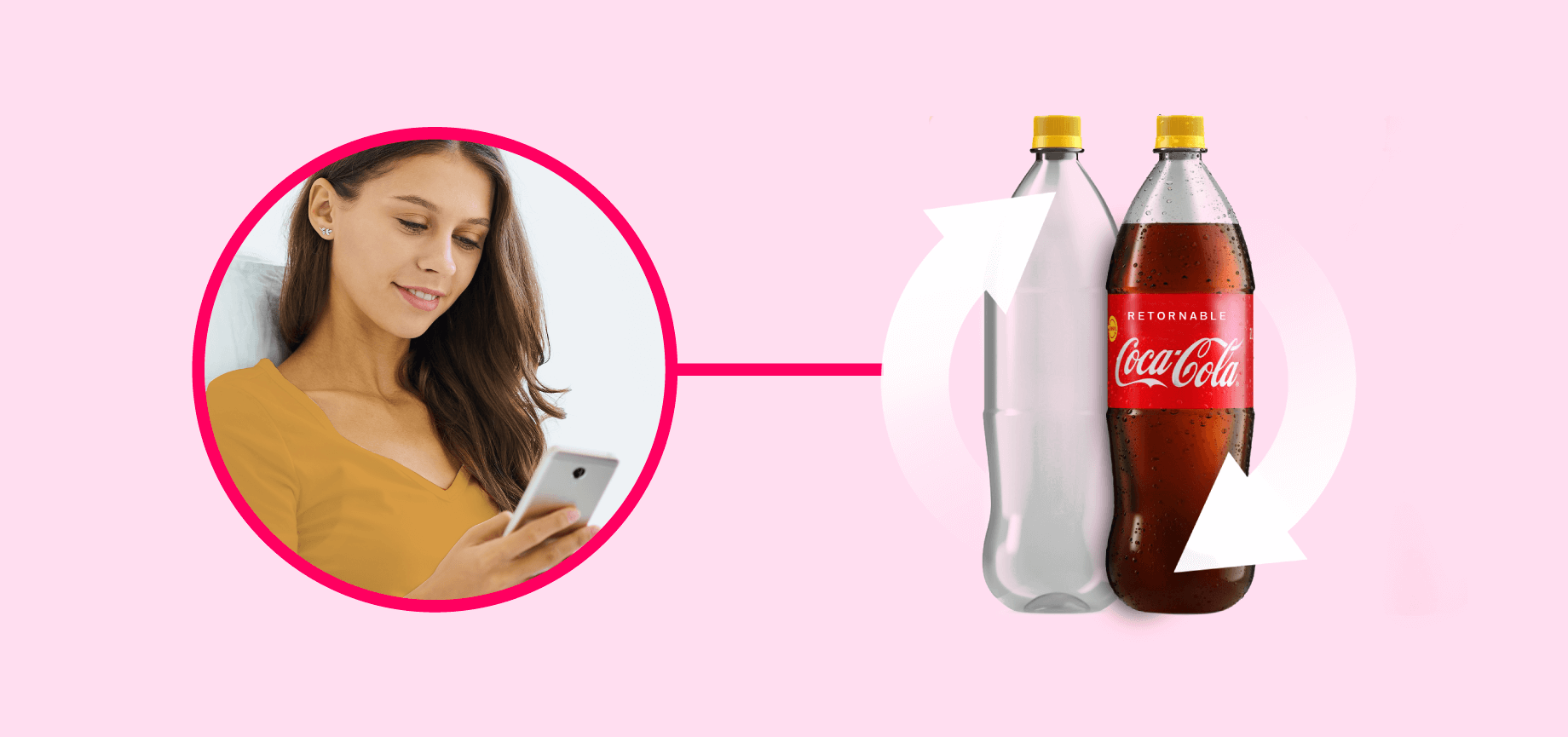
Coca-Cola Andina is a Chilean bottling partner of the Coca-Cola Company. In other words, the company is manufacturing and supplying to retailers the delicious beverages everyone knows and loves. Driven by the desire to get to know its end-customers, Coca-Cola Andina launched in 2016 miCoca-Cola.cl, a DTC ecommerce website, which ended up growing phenomenally. A key element of that bubbling success was led by Coca-Cola Andina’s returnable bottles, showcasing how business and technology can join forces to spearhead corporate and consumer sustainability alike.
Saying that returnable bottles are well-received in Chile would be an understatement. In fact, around eight out of ten Chilean households prefer returnable bottles and between 40-60% of the sales in corner stores consist of them.
The primary driver behind this comeback is the pricing: as you’re basically buying only the liquid inside when you return a bottle, the associated price is way lower than for a one-way, disposable bottle. The secondary driver, however, is the growing concern for sustainability. Eliminating the necessity for more and more plastic bottles that might never be recycled, a returnable PET can be reused, if kept in optimal shape, up to 12 times. Likewise, the returnable glass bottle up to 35 times!
So regardless if they are doing it consciously or not, Chileans are well on their way to being environmentally-friendly, supported by companies adhering to such schemes. One such company was Coca-Cola Andina which, a few years ago, made incredible investments and changed its strategy and production line to encompass returnable bottles. Soon enough, it was time for these to make a splash – online.

Since its inception, the miCoca-Cola.cl online store has offered so-called starter kits that include a case and PETs or glass bottles of various volumes filled with Coca-Cola beverages. Once you finish devouring your case, all you need to do is order a refill and an exchange of goods upon the order delivery will happen directly at your doorstep – you’ll get new bottles in 24-48 hours and the empty ones are taken back to be filled with fizzy goodness, awaiting for a new customer. You can even opt for returnable bottles if you’re buying alcoholic combos!
From a sustainability viewpoint, the Coca-Cola method of selling returnables is even more efficient than the normal process, because it is convenient. Thanks to Coca-Cola Andina’s DTC ecommerce, there are no more excuses to postpone being sustainable. The customer doesn’t need to travel to get more Coke – the Coke comes to the customer instead. Coca-Cola Andina is amongst the very few in the region that can provide the service needed to move this type of transaction in the online world. On top of an ecommerce store that technologically supports the operation, it also has a distribution network dedicated exclusively to its operations, already going to and from the same warehouses everyday, which means that handling the returns would not weigh down the logistics. Indeed, everybody wins: the customer, the company and, most importantly, earth.

But what makes the entire process borderline genius is that, on top of offering customer convenience, it also drives customer loyalty. Once you have a starter kit, you’ll keep coming back for more refills, effectively ensuring recurrent orders for Coca-Cola Andina. From a technological perspective, that recurrence rate is also aided by a repeat order feature: you can get your usual, preferred fill of Coke with just a few easy clicks. And as miraculous this is from a business standpoint, the sustainability implications make this scheme truly applaudable: the customers are hitting the environmental jackpot over and over again.
“The case of the returnable products through ecommerce has impressed everyone. Everyone in Coca-Cola knows about this success. Even the number one Coca-Cola person in the world, Santa Claus, knows about it.”
Daniel López, Ecommerce Manager at Coca-Cola Andina
Driven by such an appetizing cocktail of convenience and customer loyalty, over 50% of miCoca-Cola.cl’s orders now originate from returnable items, blowing away Coca-Cola Andina’s estimations. The company was initially expecting they wouldn’t be so attractive in its main regions of operation with traditionally affluent consumers that are not driven by pricing considerations. But instead of assuming how its consumers would behave online, Coca-Cola Andina took a gamble to test that hypothesis – and it struck gold.
“No matter what we do, we analyze and measure and review. That’s how we learn from our errors and evolve.”
Daniel López, Ecommerce Manager at Coca-Cola Andina
In Chile, Coca-Cola’s offline and online focus on returnable products has reduced the number of disposable bottles present in the market by a remarkable 5-10% while also delivering revenue growth. Moreover, by showing that the initiative is worthwhile from all angles, Coca-Cola Andina challenged other partners and even competitors across the globe to follow suit.
As the world moves towards a circular economy and an increasing preference for brands with purpose, companies need to proactively become more sustainable, ideally without compromising margins. Luckily, business and technology can seamlessly intertwine and step in to make sustainability profitable and convenient, whether it’s through fighting pollution by drinking Coke at home, or something else that you’ll come up with if you also take a gamble – just like Coca-Cola Andina did.

